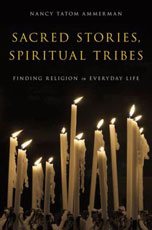Summing Up — Modes of Spiritual Practice
"The everyday lives of the Americans who participated in this project were neither completely saturated by nor devoid of spiritual activity. The degree of their spiritual interest and engagement varied from nearly (but not quite) nonexistent to intense levels of interest and activity. The group we might call 'spiritually engaged' describe themselves as spiritual people and cultivate a long list of activities aimed at seeking spiritual connections. How spiritually active our participants were was not a product of age or gender or income or education, but it was strongly connected to how active they were in their religious communities. The more often they attend services and other activities, the more stories they told about individual practices beyond the religious community. But it was not just a matter of more and less. The particular religious communities of which people were a part provided a repertoire of practices and expectations — family prayer among Mormons, scripture study among conservative Protestants, and social activist forms of spirituality among Catholics, for instance. People in spiritual tribes with tightly defined Theistic spiritualities tended to be moderately active in the practices typical of their community. They stand in contrast to those who use only Extra-theistic images, who tended to live in more diffuse spiritual tribes, less often involved in an organized religious community and drawing more randomly on practices available in the culture. They are simply less active in any spiritual practices at all.
"The most spiritually active, however, were people who speak in both Theistic and Extra-theistic spiritual images, drawing on what their particular tradition has provided for them, but also reaching beyond. Cynthia Gardner is just such a person. She is highly committed to a spiritual journey and has experimented with a fairly broad array of spiritual practices. She is also deeply involved in her Episcopal Church, so much so that she is participating in the Education for Ministry program (which trains lay leaders) and is thinking about exploring an ordained vocation as a deacon. Her involvement at All Saints has been an important part of her life for the time she has lived in Massachusetts, and it has connected her with a wide array of spiritual opportunities, including retreats, events at the nearby Episcopal seminary, and involvement in the Episcopal monastery of St. John the Evangelist in Cambridge. There she can 'go and listen to the monks chant the Psalms. [That's] a time when I can just be, and God can fill me up.' She has also enrolled in a class where she is learning to paint icons, which she describes as a deeply spiritual experience. In the midst of all that, she has also maintained a fairly regular practice of meditation she learned at a Buddhist meditation center.
" 'For years I used to go to a Buddhist meditation center on Monday night sits. There's a guy named Jack Kornfield who is one of the preeminent Buddhist monks and meditation teachers in the States. He started a meditation center in Barre, Massachusetts, and he started a meditation center in Marin County, California, called Spirit Rock; and he holds Monday night sits where you sit and meditate for forty-five minutes to an hour and then he gives a Dharma talk afterwards. Again, I don't do it every single day, but I do it several times a week.'
"Immersion in the spiritual traditions of the Episcopal Church does not erect insurmountable barriers against other spiritual practices. Rather it leaves open a door that has allowed this broad array of spiritual practices to shape Cynthia's life."
